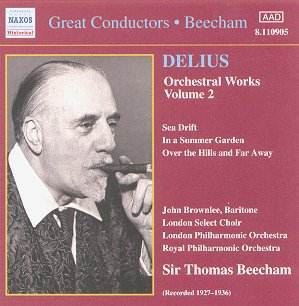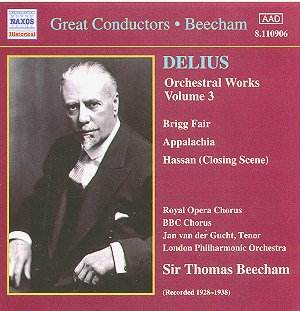FREDERICK DELIUS - The Historic EMI Recordings issued on Naxos'
Great Conductors series
DELIUS Orchestral works Vol.
1
On Hearing the First Cuckoo in Spring
Summer Night on the River
Eventyr
Koanga - Closing Scene
Hassan: Interlude; Serenade
Paris - Song of a Great
City
 RPO/LPO conducted by Sir Thomas
Beecham
RPO/LPO conducted by Sir Thomas
Beecham
 rec 1927-34
NAXOS HISTORICAL 8.110904
[61.11]
rec 1927-34
NAXOS HISTORICAL 8.110904
[61.11]
Crotchet
Amazon UK Amazon USA

When first issued the Delius Society volumes were luxury items available
only to the moneyed classes. Seven weighty 78s, a booklet written by A K
Holland all in a heavy case embossed with an outline of Delius's head added
to the exclusivity of the exercise. It was issued in 1938: a year before
the Second World War and four years after Delius's death. Now more than sixty
years later Naxos have issued a series of well produced and modestly 'processed'
discs reissuing the Delius society volumes all at super bargain price. Naxos
put us in their debt with these revivals of connoisseur recordings. Of course
the sound is historical and mono but the performances are cherished documents
and still richly enjoyable. At one time it seemed unthinkable that transfers
of this sterling quality could be available at bargain price. I recall buying
the seven LP set on World Record Club LPs at some hideous price. Naxos have
turned that world on its head.
The delectable woodwind solos point up how strong a line-up of musicians
Beecham was able to select. This really shows in the first two pieces. Eventyr
is a favourite of mine alongside the breezy North Country Sketches and Paris.
Eventyr is in spirit with Grieg's Peer Gynt - a Nordic romance leaning Bax-wards
and having more narrative backbone than is common for Delius. The Goblin
shout could have done with less English reserve and more wild abandon - better
with the RPO in the later CBS-Sony recording. The sound quality is clean
with a whisper of hiss remaining so as not to rob the natural ambience of
the originals. The same is true of all three discs.
It now seems, in retrospect, such a tragedy that Beecham never recorded the
complete operas. Imagine a Beecham Koanga, Fennimore, Magic Fountain and
Irmelin! To tantalise we have the final scene from Koanga with its
recollections of Appalachia. The choir rather shows up the limitations of
the sound.
The two Hassan snippets are done with a light touch and the Serenade's plumed
delicacy has never been equalled (Paul Beard is the solo violinist) although
Vernon Handley comes close on EMI Eminence. Rae Jenkins conducted the
BBC Welsh SO for the famous broadcast of the Flecker play back in 1972.
That performance closely rivals or often outdoes the Beecham in sensitivity.
Does anyone out there have the complete broadcast in stereo - do contact
me urgently if you have it.
Paris is Delius's rhapsodically headstrong picture of the city whose raffish
delights drew him in like a whirlpool. His years there left this memento
but also the disease which crippled him. This Song of a Great City in its
opening measures parallels Vaughan Williams' London Symphony but soon casts
off such thoughts in an accumulation of tension, expectation, dreamy romance
and an exuberance common to the wilder stretches of Ravel's La Valse. At
the close the listener is taken back to another dawn as if drowsing exhausted
near a fountain.
First class sleeve notes by Lyndon Jenkins are a strength of the series.
Reviewer
Rob Barnett
 (Historical)
(Historical)
******************************
DELIUS
Orchestral works Vol. 2
The Walk to the Paradise Garden
Sea Drift
Fennimore and Gerda - Intermezzo
In a Summer Garden
Over the Hills and Far
Away
 John Brownlee (bar)
John Brownlee (bar)
London Select Choir
RPO/LPO conducted by Sir Thomas
Beecham
 rec 1927-36
NAXOS HISTORICAL 8.10905
[62.42]
rec 1927-36
NAXOS HISTORICAL 8.10905
[62.42]
Crotchet
Amazon UK Amazon USA

The Walk is reckoned the best amongst the various Beecham recordings. It
was his disc that was played on the BBC on the night of Delius's death in
1934. It has some the most magical wind playing as also does the Fennimore
Intermezzo which is a piece created by Eric Fenby from the preludes to scenes
10 and 11 of the opera.
Sea Drift is major Delius. It is his most touching major statement - full
of highlights. John Brownlee's dark tawny tobacco tones are perfect here
although there is a trace of the stilted accent of the 1930s - a shade
disconcerting now. Bruce Boyce recorded the work with Beecham much later.
A Mass of Life was not recorded during the 1930s perhaps because its massed
textures were too demanding for the technology of the time. For that we had
to wait until the 1950s and that version has never been reissued on CD (shame
on you Sony!). Notable are the choirs 'shine great sun! and Brownlee's
heartbroken (but not sobbed) 'We two together no more.'
Beecham's Summer Garden is alive with streams, insect noises and breezes
rustling the branches. If the Garden is enclosed like something from Alain
Fournier's 'Le Grand Meaulnes', Over the Hills and Far Away is open and speaks
of the same great spaces which enliven his masterpiece The Song of the High
Hills.
Reviewer
Rob Barnett
 (Historical)
(Historical)
******************************
DELIUS Orchestral
works Vol. 3
Brigg Fair 13.45
La Calinda 3.25
Hassan - Closing scene 7.23
Irmelin Prelude 4.12
Appalachia 37.07
(all rec Abbey Rd, Studio 1,
London)
 Jan van der Gucht (ten)
Jan van der Gucht (ten)
Royal Opera
Chorus
LPO/Beecham
 NAXOS 8.110906
[66.12]
NAXOS 8.110906
[66.12]
Crotchet
Amazon UK Amazon USA

Appalachia is historically significant because, as Lyndon Jenkins points
out in his accompanying notes, this was the work which was the initiator
of the Beecham Delius story. Beecham was immediately captivated when he hear
Fritz Cassirer conduct the work in London in 1907. It is a set of rhapsodic
variations on a slave spiritual - another memento from his Florida plantation
years. It is the antithesis of the nigger minstrel plantation songs of the
vaudeville and music-hall of the time: a languid river dream, stern or joyful
at moments but largely a great, slow but inexorable journey paralleling the
journey through life to a warm and comforting oblivion. It is a work of great
beauty and remarkably well sustained over 37 minutes. The choir's part is
modest. This is largely an orchestral piece. The only blemish, to modern
ears, is the solo tenor whose diction is perfect but whose style must now
seem as dated to us as the style of singers of the present decade will seem
when heard in 2070.
Apart from the alert and springy Brigg recorded in 1928 all the tracks were
set down in 1938. You might have expected a dramatic improvement in quality
from Brigg to La Calinda but it is in fact pretty modest. These are historical
recordings modestly reprocessed to suppress clicks and other blemishes but
the level of intervention is sensitively done so as not to intrude.
Hassan is rather earthbound when it should have been ethereal. Irmelin and
the Florida memento (La Calinda) will not disappoint.
With the issue of the third disc can further instalments be far behind. Still
to come are the concertos for piano and violin, Song of the High Hills (a
priority, I hope!), A Village Romeo and Juliet, Elegy and Caprice and the
two Dance Rhapsodies. What a pity that the cello concerto and double concerto
were not done as part of the Delius society recordings in the 1930s.
Reviewer
Rob Barnett
 (Historical)
(Historical)
